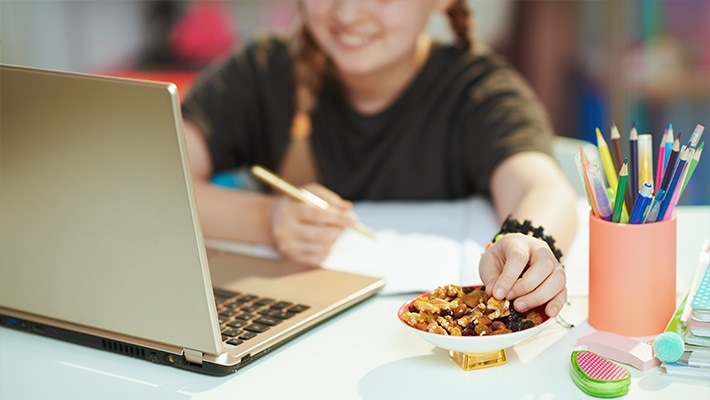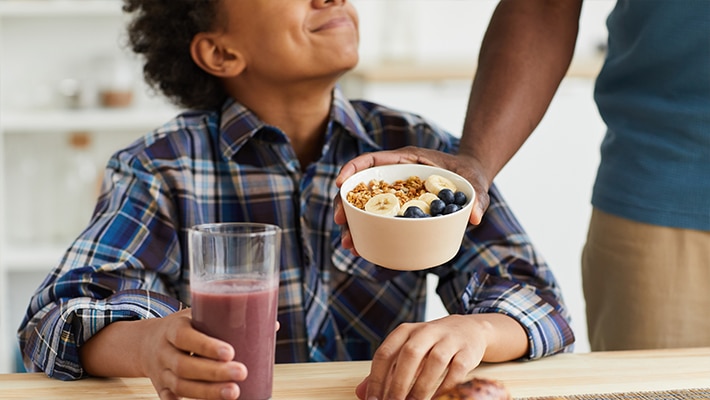10% off £35
How to reduce stress this exam season

Give them a helping hand with these top-of-the-class tips for coping with exam stress.
Each year, thousands of students take on exam season. Maybe you’ve got someone feeling the strain at home? Like every parent, you’ll want to support them so they can reach their full potential.
Though it’s down to them to put in the learning hours, they’ll need plenty of encouragement and someone to make sure they’re inspired, sleeping and resting well, and keeping stress, pressure and tension to a minimum.
So, what can you to do help make sure they’re on top form?
What can I look out for?
What can I look out for?
Staying well during stressful periods is a complex mix – and exam season is no different.
While it might be tempting (for you or for them) to focus on the study hours, you’ll also need to keep an eye on other areas that keep them happy, energised, and capable of absorbing information.*
The different factors will depend on your child - but they’re all important. Let’s go into it...


Support their brains with the proper fuel
During exam time, it’s key that they do all they can to boost their memory, concentration, and alertness:
Slow-releasing energy
A balanced diet is crucial, especially for a brain and body that needs to learn. See the NHS Eatwell Guide for information on what exactly a balanced diet means.
As well as plenty of nutritious fruit and veg, they’ll need sources of slow-releasing energy to keep them going through the day. Complex carbohydrates (like wholemeal bread, pasta, porridge, and pulses) take time for the body to break down, so they release their glucose (the source of energy) slowly and steadily. ¹
Unlike simple carbohydrates (like you’d find in white bread, cakes, and white pasta) and refined sugars, complex carbohydrates help limit the crashes that happen after eating.


Fibre-rich foods – think whole grains, potatoes, and fruit – can also keep you fuller for longer and help your child resist the temptation of quick, sugary snacks.
Don’t skip breakfast!
Evidence suggests that children who eat breakfast have better cognitive performance than those who don’t. While many of us know the importance of “brain food” on the day of an exam, the way you eat every day may affect your learning, too.
One 2012 study, featuring children aged 6-16 from across the UK, showed an increase in attention span and memory in the morning. ²
And, according to a 2019 study by the University of Leeds, students who didn’t eat breakfast on a regular basis achieved lower GCSE grades than those who did. ³
Pick wholegrain cereals and oatmeal, rather than anything packed with sugar.


Omega-3
Omega-3 fatty acids are essential for our brain health. They are highly concentrated in our brains, and nutritionists believe that they’re important for our memory and general brain function. ⁴
Try and encourage them to eat two portions of fish a week (one should be oily fish) or eat other omega-3 rich foods such as pumpkin seeds, walnuts, rapeseed oil, soya, and tofu. ⁵
Alternatively – especially if they don’t eat many of the foods above -, you might want to see if they can take omega-3 supplements.
B vitamins
B vitamins are also important for keeping your brain and body energised. There are many different types – each with their own benefits – but it’s a good idea to include a variety of them.
Most types of B vitamins help the body turn food into energy, but: ⁶
- B1: helps the body break down food and turn it into energy
- B6: helps turn carbohydrates and protein into energy, and helping the body form haemoglobin, which carries oxygen around the body
- B12: essential for making red blood cells and keeping the nervous system healthy
are particularly linked to energy and general brain function.


You can find vitamin B1 in peas, bananas, oranges, nuts, and wholegrain bread.
Poultry, pork, fish, soya beans, oats, bananas, and milk are all rich in B6. And you’ll find your vitamin B12 in meat and fish, eggs, and dairy products. Most plant milks are fortified with B12, too.
Again, it’s best for your child to get their vitamins through their diet wherever possible. But if they’re struggling, a vitamin B supplement may help – just make sure it doesn’t contain more than 100mg of thiamine (vitamin B1) per dose. ⁶
And, of course, they’ll need to stay hydrated. The NHS suggests we drink 6-8 cups of water, lower-fat milk, or sugar-free drinks (this includes tea or coffee) every day. ⁷
Help them get the right mindset to study...
Help them get the right mindset to study...
Cramming for exams too late is never a good idea as it increases stress levels. While it might be easier said than done – and everyone learns in different ways – try to provide some reminders a few weeks beforehand.
Wherever possible, they should have somewhere they can study uninterrupted – whether that’s the library or you clear the living room to give them some space.
Most teens will want to study in their bedroom, but it’s a good idea to separate revision and relaxation spaces if you can. Their room should be a safe zone for escaping the pressures of study and getting some sleep.


...and the rest they need
It’s very important they get a good night’s sleep every night – the NHS recommends 8-10 hours for most teenagers. ⁸ Not only is it essential for healthy brain function and development, but sleep has been shown to help with expansive thinking and encourage creativity. ⁹ ¹⁰ ¹¹ But, if they find drifting off difficult, they may need to adjust their bedtime routine. ¹²
Revising all night and then jumping straight into bed also isn’t ideal.
Instead, encourage them to wind down, perhaps even having a relaxing bath to prepare both their mind and body for sleep.
Many people find the scent of lavender comforting when it’s time to wind down, so maybe consider a pillow spray, room spray, or an oil diffuser to transition between revision and relaxation time.
There’s also some evidence to suggest that smells can help you associate and recall information – the olfactory bulb (a nerve associated with our sense of smell) has strong connections with our hippocampus, the part of the brain responsible for memory. ¹³
So a special scent (like a rollerball or perfume) that they only study with, and then can wear on exam day, might be worth a try.


Remember, however much you want them to do well, don’t push them too hard as they won’t perform to their potential if they’re feeling exhausted. It won’t help them in the exam room and could impact their immune system, too, meaning that they’re more likely to fall ill. ¹⁴
Getting good grades can feel like the priority now, but their health and wellbeing are much more important in the long term.
Handpicked content: The Wellness Edit: Developing healthy habits with Madeleine Shaw
Keep on moving
Being in good shape physically boosts your ability to learn. We generally feel better and have higher self-esteem after moving our bodies. Even just 10 minutes of brisk walking can help us feel more alert and ready to take on the day. ¹⁵
There’s even evidence to suggest that our language-learning abilities increase while we’re physically active!
One study on German men found that their foreign vocabulary learning was 20% faster after high-intensity exercise, both immediately afterwards and in the long term. ¹⁶
Plus, high-intensity exercise showed the strongest increase in the levels of brain-derived neurotrophic factor (a molecule that supports changes related to learning and memory) and catecholamines (a type of neurotransmitter – one example is dopamine, the “happy hormone”) when compared to light exercise and sedentary periods. ¹⁶ ¹⁷ ¹⁸In 2004, the California Department of Education analysed data from over a million children in grades 5, 7, and 9. They found that children who were more physically active performed better in a standardised academic test measuring language arts, maths, and science. ¹⁹


It’s important to note here that high levels of exercise may not cause higher results – they may be linked for other reasons – but the study found a strong positive correlation nonetheless. ¹⁹The NHS recommends that children and young people aged 5 to 18 get an average of 1 hour of moderate or vigorous exercise every day. That might include running in the playground, swimming, dancing, or cycling. ²⁰
They should also aim to get a variety of different types of exercise to strengthen their muscles and bones, and spread their activity through the day, breaking up long periods of staying sedentary. ²⁰While “teenagers” and “brisk walk” might not be an obvious match, encourage them to get out every day – it'll help blow away the cobwebs and give them time to reflect on what they’ve just revised.
Handpicked content: Fitness your kids will actually do with you
Nail the wind-down routine
There’s a huge performance gap caused by an hour’s difference in sleep in children. A study from the University of Tel Aviv showed that a slightly sleepy sixth grade pupil (aged 11-12) will perform in class similar to a fourth grader (aged 9-10). ²¹
Teenagers achieving A grades were found to be averaging 15 minutes more sleep than B students, who in turn averaged 15 more minutes than the Cs, and so on..., so every 15 minutes counts.
Set up a regular bedtime routine of at least a 30-minute wind- down for younger children. Think of the 4 Bs: bath, brushing teeth, books, and bed, at around the same time each evening.


Limit after-school activities so that bedtime doesn’t end up being pushed back too late – but don’t keep them from doing the things they enjoy. Try to limit screen time an hour before bed, though, as that pesky blue light disrupts sleep rhythms. ²²
Handpicked content: How to get a better night’s sleep
And harness the power of belief!
Confidence makes all the difference in exams, too.
A study from the 1960s showed when teachers were told certain children were more intelligent, those students did better — even though they had been randomly selected.
By the end of the school year, 30% of those singled out as “‘spurters”’ had gained an average of 22 IQ points, and almost all of them had gained at least 10 IQ points. ²³ This phenomenon is also known as the “’Pygmalion effect”’.
While IQ isn’t a sure sign of exam success, it’s vital to show your child you believe in them and get them into the exam room feeling their best.
Handpicked content: The Wellness Edit: How to love & accept yourself with Evanna Lynch
The final say
The final say
Feeling better equipped to support your kids during exam season? By keeping calm, giving them space and encouragement, and offering plenty of brain food, you’ll help them perform their best.
It’s best for children to get their vitamins through their diet wherever possible – but it’s not always easy if you’ve got a fussy eater or a child with certain medical requirements, and taking additional vitamins might help.


However, if you are going to introduce any new vitamins, try them for a few weeks leading up to exams. You don’t know what effect they may have, so it’s best not to introduce anything new at the last minute.
If you need more information on this, check out our Guide to nutrition for children.
1. https://www.bda.uk.com/resource/carbohydrates.html
2. https://www.sciencedirect.com/science/article/abs/pii/S0195666312002541
4. https://www.alzheimers.org.uk/about-dementia/risk-factors-and-prevention/omega-3-and-dementia
5. https://www.nhs.uk/live-well/eat-well/food-guidelines-and-food-labels/the-eatwell-guide/
6. https://www.nhs.uk/conditions/vitamins-and-minerals/vitamin-b/
7. https://www.nhs.uk/live-well/eat-well/food-guidelines-and-food-labels/water-drinks-nutrition/
9. https://www.sleepfoundation.org/how-sleep-works/why-do-we-need-sleep
10. https://pubmed.ncbi.nlm.nih.gov/23055117/
11. https://onlinelibrary.wiley.com/doi/abs/10.1111/joid.12104
14. https://www.sleepfoundation.org/physical-health/how-sleep-affects-immunity
16. https://www.sciencedirect.com/science/article/abs/pii/S1074742706001596?via%3Dihub
17. https://www.frontiersin.org/articles/10.3389/fncel.2019.00363/full
18. https://www.sciencedirect.com/topics/neuroscience/catecholamine
22. https://www.sleepfoundation.org/bedroom-environment/blue-light














